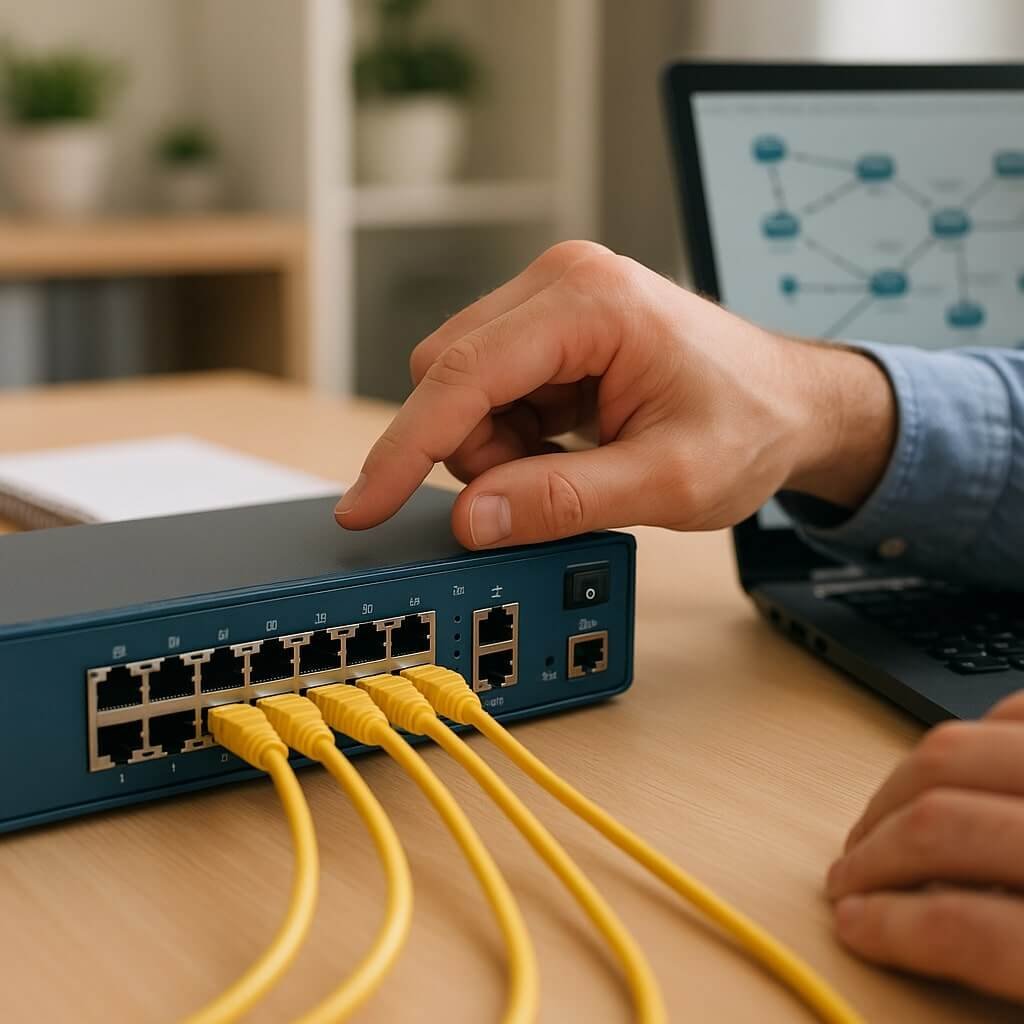In today’s digital landscape, network security isn’t just an option; it’s a necessity for your business. With cyberattacks on the rise, safeguarding sensitive data becomes critical. Protecting this information not only preserves customer trust but also guarantees compliance with various regulations. Neglecting these aspects can lead to significant financial losses and operational disruptions. Understanding the implications of inadequate security measures can reveal the broader effects on your organization’s resilience and performance. What are the specific risks you face?
Key Takeaways
- Network security protects sensitive data from cyberattacks, reducing the risk of data breaches and financial losses.
- Compliance with regulations, such as GDPR and HIPAA, is ensured through robust security measures and regular audits.
- Building customer trust and maintaining a positive business reputation is achieved by transparently communicating security practices.
- Effective network security supports business continuity, minimizing downtime and safeguarding critical operations through disaster recovery plans.
- Improved productivity and operational efficiency result from stable network conditions that allow employees to focus on their tasks without disruption.
The Growing Threat of Cyberattacks
As cyber threats continue to evolve, businesses must recognize that the risk of cyberattacks is growing at an alarming rate.
The cyber threat landscape has shifted dramatically, with threats becoming more sophisticated and targeted. Ransomware evolution exemplifies this trend; attackers are now employing advanced tactics like double extortion, where they not only encrypt data but also threaten to release sensitive information.
This evolution means that traditional security measures often fall short, leaving businesses vulnerable. You need to stay informed about emerging threats and adjust your defenses accordingly.
Investing in robust security protocols, regular vulnerability assessments, and employee training can greatly mitigate risk. Understanding the landscape is essential for proactively safeguarding your organization against these relentless cyber threats.
Protecting Sensitive Data
With cyber threats becoming increasingly sophisticated, protecting sensitive data has never been more crucial for businesses.
Implementing robust data encryption is fundamental; it guarantees that even if data is intercepted, it remains unreadable to unauthorized users. Encryption should be applied to all sensitive information, both in transit and at rest, to mitigate risks effectively.
Additionally, strong access controls are essential. You need to restrict who can view or modify sensitive data, using role-based access to limit exposure. Regularly reviewing and updating these controls minimizes vulnerabilities.
Maintaining Customer Trust
Maintaining customer trust is essential for your business’s longevity and success, especially in an era where data breaches are commonplace.
Customer trust is vital for business success, particularly in today’s world of frequent data breaches.
When you prioritize network security, you not only protect sensitive information but also cultivate a loyal customer base.
Here are three key aspects to take into account:
- Transparency: Communicate your security measures and protocols to customers, reinforcing their confidence in your brand.
- Responsiveness: Quickly address any security incidents, demonstrating your commitment to customer safety and fostering loyalty.
- Reliability: Consistently safeguard data, which enhances your brand reputation and encourages repeat business.
Compliance With Regulations
Understanding legal requirements and adhering to industry standards are essential for your business’s network security.
Non-compliance can lead to severe penalties and damage to your reputation.
Legal Requirements Awareness
How can you guarantee that your business remains compliant with the myriad of legal requirements surrounding network security?
Understanding your legal obligations is vital to avoid severe legal implications and financial penalties.
Here are three essential steps to confirm compliance with regulatory obligations:
- Conduct Regular Audits: Regularly assess your network security measures to identify vulnerabilities and confirm compliance with industry regulations.
- Stay Informed on Legislation: Keep up-to-date with changes in laws that impact data protection and privacy, such as GDPR or HIPAA, to adapt your policies accordingly.
- Implement Training Programs: Educate your employees about legal requirements and best practices to foster a culture of compliance throughout your organization.
Industry Standards Adherence
While guaranteeing compliance with industry standards may seem challenging, it’s essential for protecting your business and mitigating risks. Adhering to industry compliance not only safeguards sensitive data but also enhances your organization’s reputation.
Many industries rely on established security frameworks, such as ISO 27001 or NIST, to guide their compliance efforts. By implementing these frameworks, you can identify vulnerabilities, establish robust security measures, and guarantee that your operations meet regulatory requirements.
Furthermore, compliance helps you avoid hefty fines and legal repercussions that can arise from non-compliance. Regular audits and assessments will keep your security posture strong and aligned with industry standards, ultimately fostering trust among clients and stakeholders.
Prioritizing compliance is a proactive step toward long-term business sustainability.
Minimizing Financial Losses
To effectively minimize financial losses, businesses must prioritize robust network security measures that address potential vulnerabilities.
Implementing thorough cost reduction strategies and effective risk assessment techniques can greatly safeguard your assets.
Here are three essential steps:
- Conduct Regular Risk Assessments: Identify and evaluate potential threats to your network. This proactive approach helps you understand where your vulnerabilities lie and prioritize security investments.
- Invest in Advanced Security Solutions: Utilize firewalls, intrusion detection systems, and encryption methods to protect sensitive data from unauthorized access.
- Train Employees: Educate your staff on security protocols and phishing threats. An informed team can act as the first line of defense, minimizing the risk of costly breaches.
Ensuring Business Continuity
Guaranteeing business continuity requires a strategic approach to network security, as disruptions can greatly impact operations and revenue.
By implementing robust disaster recovery plans, you can minimize downtime and safeguard critical data. Regularly testing these plans guarantees that your team is prepared to respond effectively during incidents.
An efficient incident response strategy not only addresses immediate threats but also helps identify vulnerabilities within your network that could lead to future disruptions.
Investing in advanced monitoring tools allows you to detect anomalies in real-time, enabling swift action to mitigate potential risks.
Ultimately, a proactive stance on network security not only protects your assets but also reinforces your organization’s resilience against unforeseen challenges, guaranteeing smooth operations and sustained profitability.
Enhancing Overall Network Performance
To enhance overall network performance, you need to focus on improving data transmission efficiency, which directly impacts your operational speed.
Minimizing downtime risks is essential; any interruption can lead to significant financial losses and productivity declines.
Additionally, effective resource management guarantees that your network runs at its best, allowing you to allocate bandwidth and processing power where it’s most needed.
Improved Data Transmission Efficiency
Efficient data transmission is essential for maintaining ideal network performance in any business environment.
By implementing network security measures, you can greatly enhance data optimization and bandwidth management, allowing your operations to run smoothly.
Here are three key benefits:
- Reduced Latency: Secure protocols minimize delays, ensuring that data packets travel quickly across your network.
- Increased Throughput: Effective bandwidth management prevents congestion, allowing for higher volumes of data to be transmitted without loss.
- Enhanced Reliability: Robust security protocols protect against data loss and corruption, ensuring that information remains intact and accessible.
Minimized Downtime Risks
While network security measures may seem like a secondary concern, they play a critical role in minimizing downtime risks and enhancing overall network performance. Effective risk management strategies, including firewalls and intrusion detection systems, proactively prevent attacks that could lead to service interruptions.
By identifying vulnerabilities and implementing robust security protocols, you can guarantee consistent uptime, which is crucial for maintaining business operations. Investing in downtime prevention not only safeguards sensitive data but also preserves your organization’s reputation.
Additionally, a stable network environment fosters productivity, allowing your team to focus on their tasks without the fear of unexpected outages. Ultimately, prioritizing network security is fundamental for seamless operations and long-term success in today’s digital landscape.
Enhanced Resource Management
Maintaining consistent uptime through effective network security not only protects your operations but also enhances resource management across your organization.
By implementing robust security measures, you can streamline processes and guarantee peak resource allocation, leading to optimized workflows.
Here are three key benefits:
- Improved Performance: Secure networks reduce latency and enhance data transfer speeds, enabling faster decision-making.
- Resource Efficiency: You can allocate resources effectively, minimizing waste and guaranteeing that personnel focus on high-impact tasks.
- Strategic Planning: Enhanced security allows for better tracking of resource usage, facilitating informed strategic decisions and future investments.
Conclusion
In today’s digital landscape, prioritizing network security isn’t just advisable—it’s essential for your business’s survival. By implementing robust security measures, you’re not only protecting sensitive data and maintaining customer trust but also ensuring compliance with regulations and minimizing financial losses. This proactive approach enhances business continuity and optimizes overall network performance. Ultimately, investing in network security fosters an environment where innovation thrives, paving the way for sustainable growth and long-term success in an increasingly competitive market.






